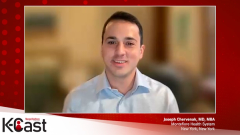
Optimizing Health Benefit Design and Patient Outcomes In Infertility Management
In his final thoughts, Dr. Chervenak provides recommendations for optimal patient outcomes by tailoring design of health benefits.
Episodes in this series

The following is a perspective from Joseph Chervenak, MD, MBA.
Chervenak believes patient education and awareness of infertility are critical for accessing services. Fertility preservation options like egg freezing are relatively new; it’s been only a decade since they were declared nonexperimental. Patients should understand lifestyle measures to optimize natural conception chances before needing treatment. Recognizing when natural methods fail and turning to medical care is also key.
In addition to knowledge of available services, supporting high-quality, innovative providers helps patients. Avoiding insurance mandates like requiring failed intrauterine insemination cycles before covering in vitro fertilization (IVF) gives qualified physicians autonomy to choose optimal care. More generous coverage for vulnerable groups could also help address disparities. Investing up front in preservation through egg freezing rather than later costly IVF may be cost-effective long-term. Outcome-based plans covering treatment until success versus capping cycles can limit financial uncertainty.
Chervenak argues applying common sense in evaluations for coverage helps too. As an example, patients undergoing preimplantation genetic testing to avoid passing on recessive disorders cannot always afford it, yet the downstream costs of caring for an affected child would be far higher. Removing financial limitations in such clear situations benefits all parties. Overall, multifaceted approaches to education and sensible evaluations of individual circumstances are needed to expand affordable access to quality fertility treatment.
Video synopsis is AI-generated and reviewed by Managed Health Care Executive editorial staff.
Newsletter
Get the latest industry news, event updates, and more from Managed healthcare Executive.





















